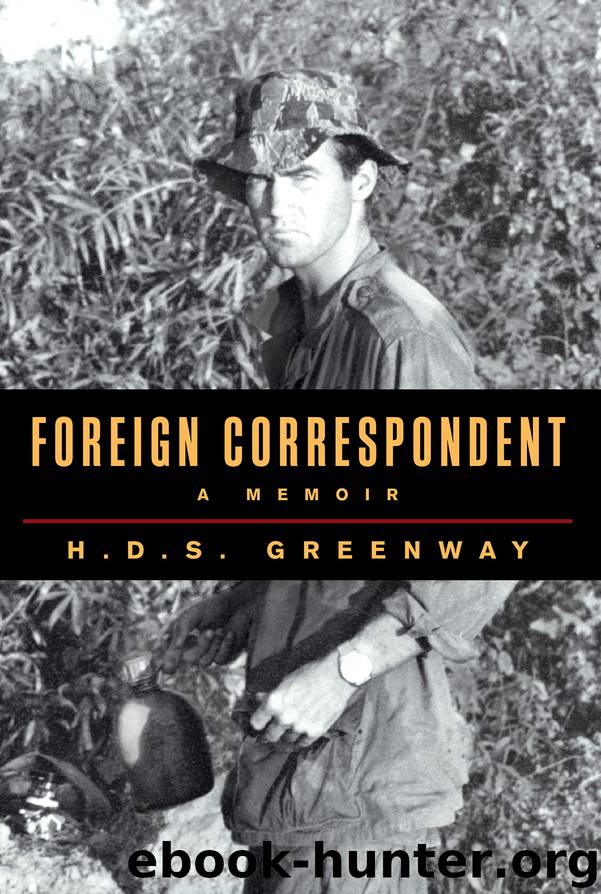Foreign Correspondent : A Memoir (9781476761381) by Greenway H.d.s

Author:Greenway, H.d.s.
Language: eng
Format: epub
Publisher: Simon & Schuster
* * *
I. Norman Lewis, A Dragon Apparent (London: Jonathan Cape, 1951), 193.
II. The monarchy was restored in 1993, and Sihanouk was back on the throne.
16
Indonesian New Guinea: Stoning the Stone Age Men
A couple of notebooks in my cellar look more than usually tattered and sweat stained, and they contain some random information about cannibalism. They date from the sixties and seventies, when I made several trips back in time, or so it seemed, to an island in New Guinea where there were pockets of the population not far removed from the Stone Age. Lying north of Australia, it is the second-biggest island in the world after Greenland. The western half once belonged to the Dutch East Indies and is now a part of Indonesia. The eastern half was colonized in the north by imperial Germany and in the south by the British. After the First World War, Australia took over the entire eastern half until Papua New Guinea became independent in 1975.
With peaks as high as the Alps, with dark rivers, and jungles, and upland plateaus that look like they could be in Europe, New Guinea is altogether unique. The uplands are inhabited by a population that was all but hidden from the rest of the world until well into the twentieth century.
Although cannibalism and head-hunting had been largely suppressed by the time I reached those shores forty years ago, there were still a few pockets of backsliding despite the efforts of missionaries and governments. There were people who might have flown in an airplane but had never driven in a car. The coasts had been known to Europeans since the sixteenth century when the Portuguese began exploring the South Seas. The island was named because it reminded Portuguese sailors of the west coast of Africa. The highlands contained a population of almost a million people that were only discovered and exposed to outsiders in the 1930s when Australian gold prospectors made their way deep into the interior.
The photographs of those first meetings between white Australians and the darker Melanesian Papuans reveal what the indigenous peoples of the Americas must have felt when they first encountered Columbus and his crew. The photos show expressions of fear and utter amazement. They asked the Australian prospectors the exact same question that Columbus had been asked: “Are you our ancestors?”
Trouble came only when curious natives tried to snatch the Australians’ gear. These misunderstandings about the nature of private property were similar to those between the early settlers in New England and the native population, and similar to Captain Cook’s troubles in Tahiti. And, as in those previous cases, the natives were awed by gunpowder, which the Australians were not hesitant to use.
When Sukarno, the fiery first leader of independent Indonesia, took over from the Dutch after World War II he demanded control over every territory that had once been Dutch. The Dutch, in turn, regretfully left most of their island empire to Sukarno, but held on to New Guinea, claiming that the Papuans had no cultural or ethnic connection to the rest of Indonesia and therefore needed Dutch protection.
Download
This site does not store any files on its server. We only index and link to content provided by other sites. Please contact the content providers to delete copyright contents if any and email us, we'll remove relevant links or contents immediately.
| Military | Political |
| Presidents & Heads of State | Religious |
| Rich & Famous | Royalty |
| Social Activists |
Waking Up in Heaven: A True Story of Brokenness, Heaven, and Life Again by McVea Crystal & Tresniowski Alex(37781)
Empire of the Sikhs by Patwant Singh(23066)
We're Going to Need More Wine by Gabrielle Union(19030)
Hans Sturm: A Soldier's Odyssey on the Eastern Front by Gordon Williamson(18564)
Leonardo da Vinci by Walter Isaacson(13304)
The Radium Girls by Kate Moore(12011)
Tools of Titans by Timothy Ferriss(8360)
Educated by Tara Westover(8041)
How to Be a Bawse: A Guide to Conquering Life by Lilly Singh(7464)
Permanent Record by Edward Snowden(5825)
The Last Black Unicorn by Tiffany Haddish(5622)
The Rise and Fall of Senator Joe McCarthy by James Cross Giblin(5266)
Promise Me, Dad by Joe Biden(5139)
The Wind in My Hair by Masih Alinejad(5085)
A Higher Loyalty: Truth, Lies, and Leadership by James Comey(4945)
The Crown by Robert Lacey(4799)
The Iron Duke by The Iron Duke(4345)
Joan of Arc by Mary Gordon(4091)
Stalin by Stephen Kotkin(3950)
